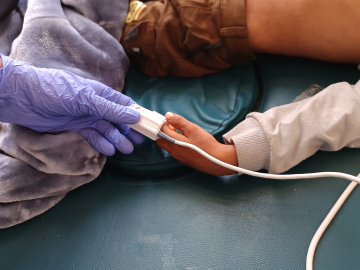Health on the Move
1.3 million Venezuelans arrived in Colombia in less than 18 months.
More than 1 million have passed through Ecuador and 250,000 remain.
And 3.6 million people have fled Syria to Turkey.
With more than 68.5 million people forcibly displaced from their homes and 258 million international migrants, there’s an obvious question: How can their health be ensured?
Health ministers, WHO officials, migration experts and others weighed in on solutions at a Tuesday #WHA72 side event. Their common theme: There’s no universal health coverage unless refugees, migrants and internally displaced people have access to quality care. (UHC is the theme of this year’s World Health Assembly, running this week and into next week in Geneva.)
“Not addressing migrant health is a recipe for disaster,” said Jacqueline Weekers, director of the Migration Health division of the International Organization for Migration. “Migrants face stigma and discrimination. Many migrants are working and living in conditions of exploitation.”
Ernest Massiah, World Bank manager of Health for Middle East and North Africa, said that technology can help countries locate refugees and understand their needs. In Turkey, for example, an analysis of Turkish and Arabic usage in social media uncovered surprising migratory patterns. And the unfulfilled requests for care by refugees can provide valuable data on their needs, which have included care for mental health issues, gender-based violence and noncommunicable diseases, he said.
Massiah also called on host countries to flip their frequent perception of migrants as a negative, see them as a positive and make use of the skills they bring—especially for those work in health.
Veronica Espinosa, Ecuador’s Minister of Public Health, reminded attendees of each country’s responsibilities to those who enter their country. “Every human being has a right to health, and it cannot be conditioned to a migratory situation,” Espinosa said. “Responsibility for human rights isn’t a jurisdictional problem. We have to protect them.”
And then there is of course, the challenge of how to pay for the health needs of migrants.
Lower-income and middle-income countries like Lebanon and Peru have absorbed migrants and the cost for health care that comes with them. Colombia’s health minister Juan Pablo Uribe said that health needs by Venezuelans who came to his country has cost more than $110 million per year, for example.
It’s clear some kind of financial support is needed, said Paul Spiegel, director of the Center for Humanitarian Health at Johns Hopkins Bloomberg School of Public Health. ”There needs to be an innovative financial mechanism—perhaps like the Global Fund—to offset the burden these countries are spending to take care of migrants and refugees,” he said.
Check out the latest news from #WHA72 here.
Join the tens of thousands of subscribers who rely on Global Health NOW summaries and exclusive articles for the latest public health news. Sign up for our free weekday enewsletter, and please share the link with friends and colleagues.
A May 21 #WHA72 side event focused on migration and health. (Image: BWS)





